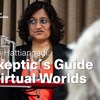scepticism
Moral Skepticism and the Benacerraf Challenge
In: D. Machuca (ed.), “Moral Skepticism: New Essays”, London: Routledge. Moral skepticism is at present a vibrant topic of philosophical inquiry. This collection of original essays will advance the ong
Counterfactual Skepticism and Multidimensional Semantics
Erkenntnis, pp. 1-24. Abstract It has recently been argued that indeterminacy and indeterminism make most ordinary counterfactuals false. I argue that a plausible way to avoid such counterfactual skepti
Moral Realism and the Argument from Skepticism
in International Journal for the Study of Skepticism10 (ISSN: 2210-5697). Abstract:A long-standing family of worries about moral realism focuses on its implications for moral epistemology. The underlyi
A New Route from Moral Disagreement to Moral Skepticism
Journal of the American Philosophical Association Abstract Moral disagreement is sometimes thought to pose problems for moral realism because it shows that we cannot achieve knowledge of the moral facts
Review of A World Without Values. Essays on John Mackie’s Moral Error Theory
Joyce, R., and Kirchin, S. (eds.) (Springer, 2010) in International Journal for the Study of Skepticism 5, 2015, 333-337. DOI: 10.1163/22105700-05031197
Daniel Cohnitz: Trust no one? The (social) epistemological consequences of belief in conspiracy theories
Daniel Cohnitz, Professor of Theoretical Philosophy, Utrecht University. Abstract Conspiracy theorists are typically skeptical about the trustworthiness of central governmental institutions. Some philos
Richard Bellamy: Taking Back Control: Why National Democracy Needs the EU, and the EU Needs National Democracy
Richard Bellamy, Professor of Political Science, UCL and Director of the Max Weber Programme, EUI. Visiting Professor at the University of Exeter. Abstract The muted popular support for, and certain faiI dispute this analysis. I argue that the EU’s role consists of supporting the democratic institutions of the member states, not least by enabling them to regulate their mutual interactions in non-dominating ways. From this perspective, the standard solution to the EU’s democratic deficit would create a domestic democratic deficit within each of the member states, one I contend democracy at the EU level would be unable to compensate for. Indeed, the current rise in Euro scepticism can be regarded as a product of this situation. By contrast, I suggest we conceive the EU as an association of democratic states, the decisions of which are under their joint and equal control. Drawing on the book, the talk will cover why such an arrangement is necessary, the norms that govern it, and the institutional framework required for it to work effectively and efficiently as well as equitably.
Malcolm Fairbrother (presenter): How Much Do People Value Future Generations? (paper together with Gustaf Arrhenius, Krister Bykvist, Tim Campbell, webinar)
Malcolm Fairbrother is professor of sociology at Umeå University and researcher at the Institute for Futures Studies. In this seminar he presents the paper How Much Do People Value Future Generations? C
Problems for Moral Debunkers: On the Logic and Limits of Empirically Informed Ethics, written by Peter Königs
International Journal for the Study of Skepticism Review of Peter Königs,Problems for Moral Debunkers: On the Logic and Limits of Empirically Informed Ethics. Berlin & Boston: De Gruyter, 2022. Pp.: 9783110750171.

Anandi Hattiangadi: A Skeptic's Guide to Virtual Worlds - A response to David Chalmers
Are virtual worlds "real"? Or are they merely "virtual"? In a recent book by David Chalmers, "Reality + - Virtual Worlds and the Problems of Philosophy", he argues that if we in fact were already livi








